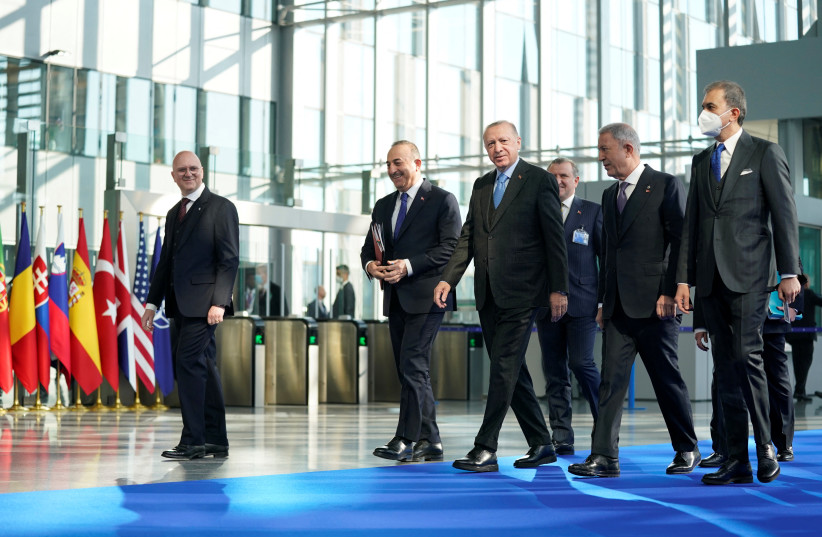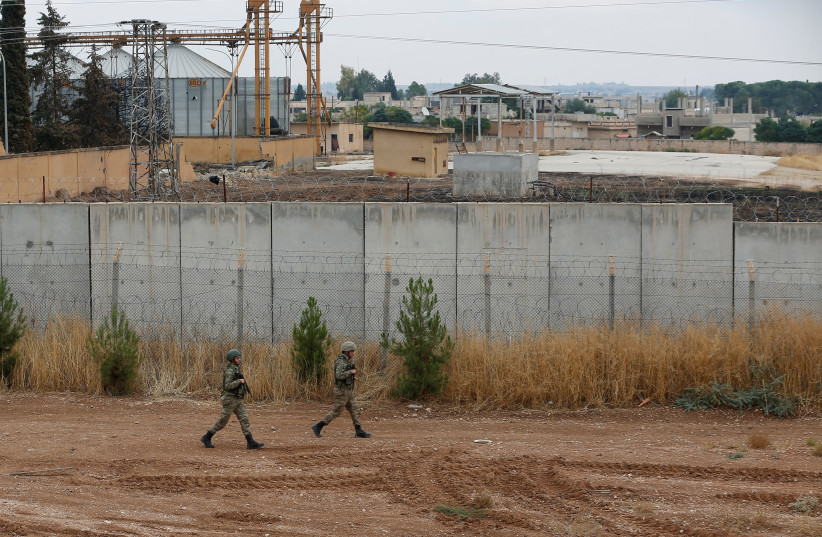Turkey has vowed a new invasion in Syria, modeled on Russia’s invasion of Ukraine. Their premise? Claiming a need to “clean” or “clear” an area near the border of “terrorists.”
President Tayyip Erdogan said on Wednesday Turkey will rid northern Syria’s Tal Rifaat and Manbij areas of terrorists, confirming the targets of the new incursion for the first time and saying it will continue into other regions.
His comments, in a speech to lawmakers from his ruling AK Party, came a week after he pledged a new military incursion on Turkey’s southern border against the US-backed Syrian Kurdish militia YPG, which Ankara views as a terrorist group.
“We are going into the new phase of our determination to form a 30-km deep safe zone along our southern border. We will clear Tal Rifaat and Manbij of terrorists, and we will do the same to other regions step-by-step,” he said.
“Let’s see who supports these legitimate steps by Turkey and who hinders them,” Erdogan added.

The commander of the US-backed Syrian Democratic Forces (SDF) said on Thursday a new offensive threatened by Turkey in northern Syria would create a humanitarian crisis and undermine a campaign against the Islamic State group.
SDF general commander Mazloum Abdi called on all sidesto “prevent any new tragedies and support de-escalation.”
“We are concerned about new Turkish threats which pose high risk on northern Syria. Any offensive will divide Syrians, create a new humanitarian crisis, and displace original inhabitants,” he wrote on Twitter.
Turkey’s last invasion of Afrin in 2018 and later Sere Kaniye in 2019 led to hundreds of thousands of people being forced to flee and minorities being ethnically cleansed. Kurds, Yazidis and Christian minorities are Turkey’s main targets.
As part of what appears to be a blackmail strategy, Ankara has been talking up its invasion while it prevents democratic Finland and Sweden from joining NATO. It uses its membership in NATO to give it cover for invasions. Whereas Russia is critiqued for attacking peaceful Ukraine, and whereas countries like Serbia were similarly slammed in the 1990s for conflicts that led to ethnic cleansing, Turkey can openly expel minorities and invade and occupy Syria apparently without criticism. This is because countries like Sweden that may have critiqued Ankara in the past now need its support to enter NATO.
Turkey waited until the crisis with NATO to begin talk of a new invasion. It has done this in the past. In 2018, it worked with pro-Ankara voices in the Trump administration to get the White House to open the gates for invasions in Syria. Turkey began in Afrin, getting backing from Russia – which backs the Syrian regime but also sells Turkey S-400s. So Moscow believed it could get Damascus to sacrifice Afrin, which was controlled by Kurdish groups, in exchange for Russia moving Turkey away from NATO.
This began a bidding war for Turkey’s support between the US and Russia. America was soon tacitly approving an invasion in 2019 with the belief that if Ankara got what it wanted in Syria, then it might shift away from Moscow and help the US on Iran issues. Instead, Turkey began to threaten Israel, Greece and the UAE – and the White House realized too late that it had enabled and appeased an aggressor.
Turkey's efforts in the past
ANKARA TRIED to press the Biden administration for new invasions in 2021 but the US pushed back then – and is now pushing back again. Turkey has instead gone to Moscow to try to justify invading an area of Syria near Aleppo, where the Syrian regime has influence.
The real control on the ground is generally done via groups linked to the Syrian Democratic Forces. These groups, such as the YPG or PYD tend to be run by Kurds and also have Arab, Christian and other elements. While the Syrian regime ostensibly controls these areas, it outsources control to the Kurdish-led groups. This creates a patchwork of issues, which Turkey exploits. For instance, it expelled some 160,000 Kurds from Afrin in 2018, many of whom went to Til Rifat. Then it bombed the IDP camps, claiming it was targeting “terrorists.”

Civilians in these areas have no ability to protest the endless invasions and wars Ankara has launched. This is because Syrians are only barely recovering from 10 years of civil war. ISIS took over large swaths of Syria. The US helped the Kurds, leading the SDF to defeat the global jihadist organization in 2017.
But Turkey also mobilized Syrian rebel groups, which it co-opted for its own ends, using them to fight Kurds. This strange situation meant that the US helped the SDF take over eastern Syria and defeat ISIS, while Turkey consolidated control with mostly Arab and Turkmen fighters in northwestern Syria.
The Syrian regime and Iran, as well as Russia, benefited from all this, and by 2018, the regime had taken back a swath of the country. Turkish-occupied areas of Syria became home to extremists, as well as many IDPs. The extremists prey on the local people, kidnap and rape them, and force them to pay bribes. The US has targeted ISIS and Al Qaeda in Turkish-controlled areas.
Turkey's current foreign relations
THAT BRINGS us to 2022. Turkey is telling Russia that it wants to invade a new area and that Moscow must accept this to get Ankara’s backing for its war in Ukraine. Turkey tells NATO it must remain quiet or Ankara will keep Finland and Sweden out. It then mobilizes its lobbyists in Washington to spread stories in US media – and Ankara gets access to publications like the Economist to sell its authoritarian agenda via a “guest essay” by its president this week. It even tries to reach out to Israel and pro-Israel voices so that it won’t get as much push-back.
Turkey knows that Greece is now more favored in Congress and thinks that pro-Israel voices might go to bat for it on the hill. This is despite the fact that the current AKP leadership of Turkey has slammed Israel as a “Nazi” country in the past, and hosted Hamas terrorists. Turkey sent its foreign minister to Israel recently and hosted President Isaac Herzog. Ankara also outreaches to Saudi Arabia, the UAE and others. It also had high level talks with Pakistan recently designed to boost trade.
All of this shows how Turkey is able to further its own interests by continuing to take advantage of other countries’ need for its support so they can further theirs.
Reuters contributed to this report.
